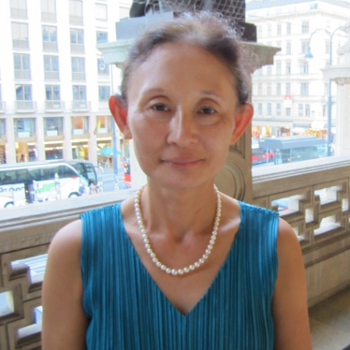For his final opera as Principal Conductor of the Staatskapelle Dresden, Christian Thielemann was in the Semperoper pit for a new production by David Bösch of Die Frau ohne Schatten. Richard Strauss and Hugo von Hofmannsthal’s fourth collaboration is a towering masterpiece full of symbolism and allegory centred around two couples, one in heaven, the other on earth, each struggling in a childless marriage. Created largely before and during the World War 1, the story reflects both a sense of ominous foreboding and optimism for a brighter future. It is a challenging but ultimately cathartic work to attend. The creative production team and the excellent musicians contributed to an unforgettable performance without the usual musical cuts, with a surprise at the end, an exercise of directorial freedom.
Set designer Patrick Bannwart represents the heavenly sphere by transparent floor to ceiling white curtains concealing the pure white marital bed of the Emperor and Empress. The Empress and her Nurse descend to the human world in an elevator, which doubles as the door to a drab grey room that is the work and living space of Barak the Dyer and his Wife. A bed is present there, not in the centre but on the side. A black curtain is lowered during scene changes for the audience to luxuriate in Strauss' transitional music without distraction. Videos (Bannwart and Falko Herold) are used sparingly and judiciously to represent imaginary animals and children. A giant white falcon hovers over the Empress’ nightmares; the Dyer’s Wife’s fantasies are bathed in pink dresses; Barak’s feast includes gigantic fish and a pig.
After the cataclysmic event at the end of Act 2, resulting in the division of Barak’s room into two to signal the couple’s estrangement, the room is put back together towards the end of Act 3. Yet I had a strange feeling that it was no longer the same room. We have gone through a spiritual journey with the protagonists after which nothing is ever the same. Sure enough, the opera ends as the room is again divided into two platforms that move away from one another, one with the Empress and Barak, the other with the Emperor and Barak’s Wife. The juxtaposition of the couples is engineered by the Nurse, who remains alone on stage. Despite this final twist, Bösch's production excels in its coherence and ability to tell the story in a straightforward manner.
Camilla Nylund’s Empress reminded one that this opera is indeed about the woman without shadow. After a challenging opening scene full of high flying lyrical and coloratura passages, the Empress is largely silent in the middle act. But the third belongs to her, as she acquires sympathy and understanding of humanity and confronts her destiny. Here the role requires a strong, dramatic voice, including declamatory speech. Nylund possesses a soprano of sheer beauty; her voice remained pure and secure as it rode higher, cutting through the heavy orchestration. It was a pleasure to hear a singer sailing through this challenging role. Eric Cutler sang the Emperor with power, nuance and sensitivity, and the transition to the higher tessitura was handled seamlessly and deftly.
Ukrainian bass-baritone Oleksandr Pushniak, making his role debut as Barak, proved to be an excellent and accomplished complement to his more experienced colleagues. The voice is large but focused, with beautiful legato where needed. His acting as a loving and bewildered husband was sympathetic and genuine. As the Dyer's Wife, Mina-Lisa Värelä sang with ample power and sumptuous chest voice, but her high notes tended towards shrillness.
The Nurse is the longest and most difficult role in this opera. Veteran soprano Evelyn Herlitzius was very much up to the task, garnering the biggest applause of the evening. Her voice, while small, carried well and clearly. She negotiated the wide vocal range with aplomb and boundless energy, moving graciously and athletically. Herlitzius' Nurse here was a master sociopath, feigning sympathy for the imperial couple and seducing the Dyer’s Wife while spinning her own plot of destruction. Her final blank stare was chilling. The rest of the cast was equally impressive, with Nikola Hillebrand as Guardian of the Threshold and Andreas Bauer Kanabas as the Spirit Messenger of Keikobad being the standouts.
Words almost fail whenever Christian Thielemann conducts Strauss. He is always mindful of singers, controlling dynamics, yet managing to summon the most thrilling and moving sounds from the Staatskapelle Dresden. He will be missed here but will be welcomed in Berlin, when he takes up the role of Generalmusikdirektor at the Staatsoper Unter den Linden in September.




